Compliance and Regulation Law bilingual Dictionnary

Competition is the law of the market. It allows the emergence of the exact price, which is often referred to as "fair price". It means and requires that agents on the market are both mobile, that is to say free to exercise their will, and atomized, that is to say, not grouped together. This is true for those who offer a good or service, the offerers, as well as for those seeking to acquire them, the applicants: the bidders seek to attract the applicants so that they buy them the goods and services that they propose. Bidders are in competition with each other.
In the competitive market, buyers are indulging in their natural infidelity: even if they have previously bought a product from an A supplier, they will be able to turn away from him in favor of a B supplier if the latter offers them a product more attractive in terms of quality or price. Price is the main signal and information provided by the suppliers on the market to excite this competitive mobility of the offerers. Thus, free competition accelerates market liquidity, the circulation of goods and services, raises the quality of products and services and lowers prices. It is therefore a moral and virtuous system, as Adam Smith wanted, a system which is the fruits of individual vices. That is why everything that will inject "viscosity" into the system will be countered by Competition Law as "non-virtuous": not only frontal coordination on prices but for example, exclusivity clauses, agreements by which companies delay their entry on the market or intellectual property rights which confer on the patentee a monopoly.
Admittedly, Competition Law can not be reduced to a presentation of such simplicity, since it admits economic organizations which deviate from this basic model, for example distribution networks or patent mechanisms on which, inter alia, is built the pharmaceutical sector. But the impact is probative: in the sphere of Competition Law, if one is in a pattern that is not part of the fundamental figure of the free confrontation of supply and demand, he has to demonstrate the legitimacy and efficiency of its organization, which is a heavy burden on the firm or the State concerned.
Thus, in the field of Regulation, if regulatory mechanis were to be regarded as an exception to competition, an exception admitted by the competition authorities, but which should be constantly demonstrated before them by its legitimacy and effectiveness in the light of the "competitive order", then public organizations and operators in regulated sectors would always face a heavy burden of proof. This is what the competition authorities consider.
But if we consider that regulated sectors have a completely different logic from competitive logic, both from an economic and a legal point of view, the Law of Regulation refers in particular to the notion of public service and having its own institutions, which are the regulatory authorities, then certain behaviors, in particular monopolies, are not illegitimate in themselves and do not have to justify themselves in relation to the competitive model, for they are not the exception ( Such as the public education or health service).
Publications : Doctrine
► Référence complète : Roda, J.-Ch, Vers un droit de la concurrence des plateformes , in L'émergence d'un droit des plateformes, Dalloz, coll. « Thèmes et commentaires », 2021, pp.77-90.
_____
► Lire la présentation générale de l'ouvrage dans lequel s'insère cet article.
Thesaurus : Doctrine
Thesaurus : Doctrine

Référence complète : Terré, F., Concurrence et proportionnalité, in Parléani, G. (coord.), Mélanges en l'honneur du Professeur Claude Lucas de Leyssac, LexisNexis, novembre 2018, pp.467-471.
____
Lire une présentation générale des Mélanges dans lesquels l'article a été publié.
____
Thesaurus : Doctrine
Référence Complète : Europe Economics, Etat des lieux et perspectives des programmes de conformité, Etude réalisée pour le Conseil de la Concurrence, 2008.
Thesaurus : Doctrine

► Full Reference: Marty, F., The Case for Compliance Programs in International Competitiveness: A Competition Law and Economics Perspective, in Frison-Roche, M.-A. (ed.),Compliance Monumental Goals, series "Compliance & Regulation", Journal of Regulation & Compliance (JoRC) and Bruylant, to be published.
____
► Article Summaryésumé de l'article (done by the Journal of Regulation & Compliance): The author analyzes economically the question of whether the compliance programs set up to respect competition rules are for the sole purpose of avoiding sanctions or also contribute to the goal of increasing the international economic performance of companies. which submit to them.
The author explains that companies integrate by duplication external standards to minimize the risk of sanctions, developing a "culture of compliance", which produces their competitiveness increase and the effectiveness of the legal and economic system. In addition, it reduces the cost of investment, which increases the attractiveness of the company.
In this, this presentation based on the postulate of the rationality of companies and investors, compliance programs can fall under self-regulation. The duplication of the law that they operate takes place largely according to "procedural" type methods.
____
📝 go to the general presentation of the book 📘Compliance Monumental Goals, in which this article is published
________
Thesaurus : Doctrine

► Référence complète : J.-Ch. Roda, "Droit de la concurrence et Droit de la Compliance", in M.-A. Frison-Roche (dir.), L'obligation de Compliance, Journal of Regulation & Compliance (JoRC) et Dalloz, coll. "Régulations & Compliance", 2024, à paraître
____
📕lire une présentation générale de l'ouvrage, L'obligation de Compliance, dans lequel cet article est publié
________
Thesaurus : Doctrine
Référence complète : Boy, , "Réflexion sur le "droit de la régulation". A propos du texte de Marie-Anne Frison-Roche", D., chron., 2001, p.3031 et s.
____
June 12, 2024
Editorial responsibilities : Direction of the collection "Regulations & Compliance", JoRC & Dalloz

🌐follow Marie-Anne Frison-Roche on LinkedIn
🌐subscribe to the Newsletter MAFR. Regulation, Compliance, Law
____
► Full Reference: M.-A. Frison-Roche (dir.), L'Obligation de Compliance, coll."Régulations & Compliance", Journal of Regulation & Compliance (JoRC) and Dalloz, to be published.
____
📘 At the same time, a book in English, Compliance Obligation, is published in the collection copublished by the Journal of Regulation & Compliance (JoRC) and the Éditions Bruylant.
____
🧮the book follows the cycle of colloquia 2023 organised by the Journal of Regulation & Compliance (JoRC) and its Universities partners.
____
📚this volume is one of a series of books devoted to Compliance in this collection.
► read the presentations of the other books:
- further books:
🕴️M.-A. Frison-Roche (ed.), 📕Le système probatoire de la Compliance, 2025
- previous books:
🕴️M.-A. Frison-Roche & M. Boissavy (eds.), 📕Compliance et droits de la défense. Enquête interne - CJIP - CRPC, 2023
🕴️M.-A. Frison-Roche (ed.), 📕La juridictionnalisation de Compliance, 2023
🕴️M.-A. Frison-Roche (ed.), 📕Les Buts Monumentaux de la Compliance, 2022
🕴️M.-A. Frison-Roche (ed.), 📕Les outils de la Compliance, 2021
🕴️M.-A. Frison-Roche (ed.), 📕Pour une Europe de la Compliance, 2019
🕴️N. Borga, 🕴️J.-Cl. Marin and 🕴️J.-Ch. Roda (eds.), 📕Compliance : l'Entreprise, le Régulateur et le Juge, 2018
🕴️M.-A. Frison-Roche (ed.), 📕Régulation, Supervision, Compliance, 2017
🕴️M.-A. Frison-Roche (ed.), 📕Internet, espace d'interrégulation, 2016
📚see the global presentation of all the books of the collection.
___
► General presentation of this book: Compliance is sometimes presented as an inescapable mechanism , which is tantamount to seeing it as the legal Obligation par excellence, Criminal Law being its most appropriate mode of expression. But this is not so obvious. Moreover, it is becoming difficult to unify all Compliance Tools, which encompass moral representations of the world, and even cultures specific to each company, so that Law can only produce incentives or produce soft law. As a result, Compliance Obligation appears as very difficult to define.
These hesitations reflect the youth of this Compliance Law under construction. Identified through juxtaposed special laws, for each of which specialists have come forward, it is nonetheless taking shape with its own normativity, anchored in its Monumental Goals. Because the notion of Obligation is as old as Law itself, the Obligation of Compliance is confronted with all the branches of Law, and more particularly, with all due respect, with Contract and Tort Law.
But Compliance has long been a practice, effectiveness, efficacy and efficiency being among its principles. How can all these ambitious declarations be put into effect? Is there not a hint of a gap between the grandiloquence of this declared Compliance Obligation and what actually happens? The practical question of how to compel is, in this new branch of Law, a question of law.
In order to have a more accurate perception of the Obligation of Compliance and therefore to better measure its future, it is advisable to end up taking its Advanced Point, which is the Obligation of Vigilance, clearer and stronger than the other instruments, having Monumental Goals, placing the Judge more clearly at the centre, developing in an already more visible way the power of this Obligation of Compliance which abstracts itself as necessary from borders and claims to express sovereignties.
____
🏗️general construction of this Book: The book opens with a double Introduction. The first, which is freely accessible, consists of a summary of the book, while the second, which is substantial, deals with the unified conception that we can, and indeed should, have, of the "Compliance Obligation", without losing the concrete and active character that characterises this branch of law.
The first Part of the book aims to define the Compliance Obligation. To this end, Chapter I deals with the Nature of this obligation. Chapter II deals with the Spaces of the Compliance Obligation.
The Part II aims to articulate the Compliance Obligation with other branches of Law.
The Part III of the book looks at the way in which the possibility of obliging and the means of obliging are provided. To this end, Chapter I deals with the Convergence of the Sources of the Compliance Obligation. Chapter II considers International Arbitration as a reinforcement of the Compliance Obligation. To this end, Chapter I deals with the Convergence of the Sources of the Compliance Obligation. Chapter II considers International Arbitration as a reinforcement of the Compliance Obligation.
The last Part of the book is devoted to Vigilance, the leading edge of the Compliance Obligation. Chapter I is devoted to a study of the various sectors, and analyses the Intensities of the Vigilance Obligation. Chapter II deals with the Variations in Tension generated by the Vigilance Obligation. Finally, Chapter III deals with the New Modalities of the Compliance Obligation, highlighted by the Vigilance Imperative.
____
TABLE OF CONTENTS
L’OBLIGATION DE COMPLIANCE : VISION D’ENSEMBLE
(COMPLIANCE OBLIGATION : OVERVIEW)
Section 1 ♦️ Lignes de force de l’ouvrage L'Obligation de Compliance (Main Aspects of the Book L'Obligation de Compliance), by 🕴️Marie-Anne Frison-Roche
Section 2 ♦️ Concevoir l’unicité de l’Obligation de Compliance sans la diluer (Conceiving the unicity of the Compliance Obligation without diluting it), by 🕴️Marie-Anne Frison-Roche
TITRE I.
CERNER L’OBLIGATION DE COMPLIANCE
(IDENTIFYING THE COMPLIANCE OBLIGATION)
CHAPITRE I : LA NATURE DE L’OBLIGATION DE COMPLIANCE
(CHAPTER I: THE NATURE OF THE COMPLIANCE OBLIGATION)
Section 1 ♦️ La Volonté, le Cœur et le Calcul (Will, Heart and Calculation), by 🕴️Marie-Anne Frison-Roche
Section 2 ♦️ La dette, notion économique comme fondement de l'Obligation de Compliance (Debt, an economic concept underpinning the Compliance Obligation), by 🕴️Bruno Deffains
Section 3 ♦️ Obligation de Compliance et droits humains (Compliance Obligation and Human Rights), by 🕴️Jean-Baptiste Racine
Section 4 ♦️ Les mutations de la souveraineté et l'Obligation de Compliance (Changes in Sovereignty and the Compliance Obligation), by 🕴️René Sève
CHAPITRE II : LES ESPACES DE L’OBLIGATION DE COMPLIANCE (SPACES OF THE COMPLIANCE OBLIGATION)
Section 1 ♦️ Entités industrielles et Obligation de Compliance (Industrial entities and Compliance Obligation), by 🕴️Etienne Maclouf
Section 2 ♦️ L'Obligation de Compliance dans les chaînes de valeur (The Compliance Obligation in Value Chains), by 🕴️Lucien Rapp
Section 3 ♦️ Compliance et conflits de lois. Le droit international de la vigilance-conformité (Compliance and conflict of laws. International Law of Vigilance-Conformity), by 🕴️Louis d'Avout
TITRE II.
ARTICULER L’OBLIGATION DE COMPLIANCE AVEC DES BRANCHES DU DROIT
(ARTICULATING THE COMPLIANCE OBLIGATION WITH BRANCHES OF LAW)
Section 1 ♦️ Dimensions constitutionnelles de l'Obligation de Compliance (Constitutional dimensions of the Compliance Obligation), by 🕴️Stéphane Mouton
Section 2 ♦️ Droit fiscal et Obligation de Compliance (Tax Law and Compliance Obligation), by 🕴️Daniel Gutmann
Section 3 ♦️ Le droit processuel, prototype de l'Obligation de Compliance (General Procedural Law, prototype of the Compliance Obligation), by 🕴️Marie-Anne Frison-Roche
Section 4 ♦️ Le droit des sociétés et des marchés financiers face à l'Obligation de Compliance (Corporate and Financial Markets Law facing the Compliance Obligation), by 🕴️Anne-Valérie Le Fur
Section 5 ♦️ Le rapport entre le Droit de la responsabilité civile et l'Obligation de Compliance (The link between Tort Law and Compliance Obligation), by 🕴️Jean-Sébastien Borghetti
Section 6 ♦️ Dimensions environnementales et climatiques de l'Obligation de Compliance (Environmental and Climatic Dimensions of the Compliance Obligation), by 🕴️Marta Torre-Schaub
Section 7 ♦️ Droit de la concurrence et Droit de la Compliance (Competition Law and Compliance Law), by 🕴️Jean-Christophe Roda
Section 8 ♦️ L'Obligation de Compliance en Droit global (The Compliance Obligation in Global Law), by 🕴️Benoît Frydman & 🕴️Alice Briegleb
Section 9 ♦️ Transformation des relations de travail et obligation de vigilance (Transformation of Labour Relations and Vigilance Obligation), by 🕴️Stéphane Vernac
Section 11 ♦️ Juge du droit des entreprises en difficulté et obligations de compliance (Judge of Insolvency Law and Compliance Obligations), by 🕴️Jean-Baptiste Barbièri
TITRE III.
COMPLIANCE : DONNER ET SE DONNER LES MOYENS D’OBLIGER
(COMPLIANCE : GIVE AND TAKE THE MEANS TO OBLIGE)
CHAPITRE I : LA CONVERGENCE DES SOURCES (CONVERGENCE OF SOURCES)
Section 1 ♦️ L’Obligation de Compliance, entre volonté et consentement : obligation sur obligation vaut (Compliance Obligation, between Will and Consent: obligation upon obligation works), by 🕴️Marie-Anne Frison-Roche
Section 2 ♦️ Ce qu'est un engagement (What a Commitment is), by 🕴️Marie-Anne Frison-Roche
Section 3 ♦️ Les technologies disponibles, prescrites ou proscrites pour satisfaire Compliance et Vigilance (Technologies available, prescribed or prohibited to meet Compliance and Vigilance requirements), by 🕴️Emmanuel Netter
Section 4 ♦️ La cybersécurité et l’Obligation de Compliance (Cybersecurity and Compliance Obligation), by 🕴️Michel Séjean
Section 5 ♦️ La place de l’espoir dans l’aptitude à appréhender l’avenir (The Place of Hope in the Ability to Apprehend the Future), by 🕴️
Section 6 ♦️ Contrainte légale et stratégie des entreprises en matière de Compliance (Legal Constraint and Company Strategies in Compliance matters), by 🕴️Jean-Philippe Denis & Nathalie Fabbe-Costes
Section 7 ♦️ La loi, source de l’Obligation de Compliance (The law, source of the Compliance Obligation), by 🕴️Jean-Baptiste Blanc
Section 8 ♦️ Opposition ou convergence des systèmes juridiques dans les règles et cultures de compliance (Opposition or Convergence of Legal Systems in Compliance Rules and Cultures), by 🕴️Raphaël Gauvain & 🕴️Blanche Balian
CHAPITRE II : L’ARBITRAGE INTERNATIONAL EN RENFORT DE L’OBLIGATION DE COMPLIANCE (INTERNATIONAL ARBITRATION IN SUPPORT OF THE COMPLIANCE OBLIGATION)
Section 1 ♦️ Le renforcement des engagements de Compliance par le renvoi Ex Ante à l’arbitrage international (Reinforcing Compliance Commitments by referring Ex Ante to International Arbitration"), by
Section 2 ♦️ La condamnation en nature par le tribunal arbitral, renfort de l’Obligation de Compliance (The Arbitral Tribunal's Award in Kind, in support of the Compliance Obligation), by 🕴️Eduardo Silva Romero
Section 3 ♦️ L’usage de l’arbitrage international pour renforcer l’obligation de Compliance : l’exemple du secteur de la construction (The use of International Arbitration to reinforce the Compliance Obligation: the example of the construction sector), by 🕴️Christophe Lapp & 🕴️Jean-François Guillemin
Section 4 ♦️ L’arbitre, juge, superviseur, accompagnateur ? (The Arbitrator, Judge, Supervisor, Support) , by 🕴️Jean-Baptiste Racine
Section 5 ♦️ L’arbitre, organe indirect et direct de l’Obligation de Compliance ? (The Arbitrator, indirect and direct agent of the Compliance Obligation?), by 🕴️Laurent Aynès
TITRE IV.
LA VIGILANCE, POINTE AVANCÉE DE L’OBLIGATION DE COMPLIANCE
(VIGILANCE, SPEARHEAD OF THE COMPLIANCE OBLIGATION)
CHAPITRE I : LES INTENSITÉS DE L’OBLIGATION DE VIGILANCE, POINTE AVANCÉE DU SYSTÈME DE COMPLIANCE (INTENSITIES OF THE VIGILANCE OBLIGATION, SPEARHEAD OF THE COMPLIANCE SYSTEM)
Section 1 ♦️ Articulation systémique entre Vigilance, Due Diligence, conformité et Compliance : la Vigilance, part totale de l'Obligation de Compliance (Systemic Articulation between Vigilance, Due Diligence, Conformity and Compliance: Vigilance, Total Share of the Compliance Obligation), by 🕴️Marie-Anne Frison-Roche
Section 2 ♦️ L’intensité de l’Obligation de Vigilance selon les secteurs : le cas des opérateurs financiers (Intensity of the Vigilance Obligation by Sectors: the case of Financial Operators), by 🕴️Anne-Claire Rouaud
Section 3 ♦️ L’intensité de l’Obligation de Vigilance selon les secteurs : le cas des opérateurs bancaires et d’assurance (Intensity of the Vigilance Obligation by Sectors: the case of Banking and Insurance Operators), by 🕴️Mathieu Françon
Section 4 ♦️ L’intensité de l’Obligation de Vigilance selon les secteurs : le cas des opérateurs numériques (Intensity of the Vigilance Obligation by Sectors: the case of Digital Operators), by 🕴️Grégoire Loiseau
Section 5 ♦️ L’intensité de l’Obligation de Vigilance selon les secteurs : le cas des opérateurs énergétiques (Intensity of the Vigilance Obligation by Sectors: the case of Energy Operators), by 🕴️Marie Lamoureux
CHAPITRE II : LES VARIATIONS DE TENSIONS ENGENDRÉES PAR L’OBLIGATION DE VIGILANCE, POINTE AVANCÉE DU SYSTÈME DE COMPLIANCE (VARIATIONS OF TENSIONS GENERATED BY THE VIGILANCE OBLIGATION, SPEARHEAD OF THE COMPLIANCE SYSTEM)
Section 1 ♦️ Repenser le concept de responsabilité civile à l’aune du devoir de vigilance, pointe avancée de la compliance (Rethinking the Concept of Civil Liability in the light of the Duty of Vigilance, Spearhead of Compliance), by 🕴️Mustapha Mekki
Section 2 ♦️ Transformation de la gouvernance et obligation de Vigilance (Transformation of Governance and Vigilance Obligation), by 🕴️Véronique Magnier
CHAPITRE III : LES MODALITÉS NOUVELLES DE L'OBLIGATION DE COMPLIANCE, MISES EN LUMIÈRE PAR L'IMPÉRATIF DE VIGILANCE (NEW MODALITIES OF THE COMPLIANCE OBLIGATION, HIGHLIGHTED BY THE VIGILANCE IMPERATIVE)
Section 1 ♦️ La façon dont l'impératif de Vigilance s'ajuste aux règles juridiques internationales (How the Vigilance Imperative fits in with International Legal Rules), by 🕴️Bernard Haftel
Section 2 ♦️ Contrats et clauses, mise en œuvre et modalités de l’Obligation de Vigilance (Contracts and clauses, implementation and modalities of the Vigilance Obligation), by 🕴️Gilles J. Martin
Section 3 ♦️ La preuve de la bonne exécution de la Vigilance au regard du système probatoire de Compliance (Proof that Vigilance has been properly carried out with regard to the Compliance Evidence System), by 🕴️Jean-Christophe Roda
TITRE V.
LE JUGE ET L'OBLIGATION DE COMPLIANCE
(THE JUDGE AND THE COMPLIANCE OBLIGATION)
Section 1 ♦️ Les enjeux présents à venir de l’articulation des principes de procédure civile et commerciale avec la logique de compliance (Present and Future Challenges of Articulating Principles of Civil and Commercial Procedure with the Logic of Compliance), by 🕴️Thibault Goujon-Bethan
Section 2 ♦️ La médiation, voie d'avenir pour une Obligation de Compliance effective (Mediation, the way forward for an Effective Compliance Obligation), by 🕴️Malik Chapuis
Section 3 ♦️ Le Juge requis pour une Obligation de Compliance effective (The Judge required for an Effective Compliance Obligation), by 🕴️Marie-Anne Frison-Roche
________
May 24, 2024
Conferences
🌐follow Marie-Anne Frison-Roche on LinkedIn
🌐subscribe to the Newsletter MAFR Regulation, Compliance, Law
____
► Full Reference: M.-A. Frison-Roche, "Synthèse" ("Synthesis"), in Concurrence : les enjeux de la Compliance, May 24, 2024, Paris, Collège européen de Paris, Paris Panthéon-Assas University, 28 rue Saint-Guillaume
____
🧮see the full programme of this event
____
► Presentation of the conference :
________
April 18, 2024
Publications
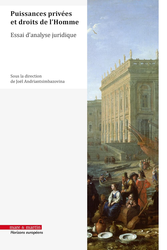
🌐follow Marie-Anne Frison-Roche on LinkedIn
🌐subscribe to the Newsletter MAFR Regulation, Compliance, Law
____
► Full reference: M.-A. Frison-Roche, "L’usage des puissances privées par le droit de la compliance pour servir les droits de l’homme" (Use of private companies by Compliance Law to serve Human Rights) , in J. Andriantsimbazovina (dir.), Puissances privées et droits de l'Homme. Essai d'analyse juridique, Mare Martin, coll. "Horizons européens", 2024, to be published
____
🚧read the Bilingual Working Paper on which this article is based, with more technical developments, references and hypertext links
____
► English Summary of this article: Following the legal tradition, Law creates a link between power with a legitimate source, the State, public power being its prerogative, while private companies exercise their power only in the shadow of this public power exercised ex ante. The triviality of Economic Law, of which Competition Law is at the heart, consisting of the activity of companies that use their power on markets, relegates the action of the State to the rank of an exception, admissible if the State, which claims to exercise this contrary power, justifies it. The distribution of roles is thus reversed, in that the places are exchanged, but the model of opposition is shared. This model of opposition exhausts the forces of the organisations, which are relegated to being the exception. However, if we want to achieve great ambitions, for example to give concrete reality to human rights beyond the legal system within which the public authorities exercise their normative powers, we must rely on a new branch of Law, remarkable for its pragmatism and the scope of the ambitions, including humanist ambitions, that it embodies: Compliance Law.
Compliance Law is thus the branch of Law which makes the concern for others, concretised by human rights, borne by the entities in a position to satisfy it, that is to say the systemic entities, of which the large companies are the direct subjects of law (I). The result is a new division between Public Authorities, legitimate to formulate the Monumental Goal of protecting human beings, and private organisations, which adjust to this according to the type of human rights and the means put in place to preserve them. Corporations are sought after because they are powerful, in that they are in a position to make human rights a reality, in their indifference to territory, in the centralisation of Information, technologies and economic, human, and financial means. This alliance is essential to ensure that the system does not lead to a transfer of political choices from Public Authorities to private companies; this alliance leads to systemic efficiency. The result is a new definition of sovereignty as we see it taking shape in the digital space, which is not a particular sector since it is the world that has been digitalised, the climate issue justifying the same new distribution of roles (II).
____
📝read the article (in French)
________
April 4, 2024
Publications
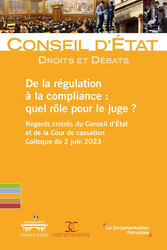
🌐follow Marie-Anne Frison-Roche on LinkedIn
🌐subscribe to the Newsletter MAFR Regulation, Compliance, Law
____
► Full Reference: M.-A. Frison-Roche, "Le rôle du juge dans le déploiement du droit de la régulation par le droit de la compliance" ("Synthesis: The role of the Judge in the deployment of Regulatory Law through Compliance Law"), Synthesis in Conseil d'État (French Council of State) and Cour de cassation (French Court of cassation), De la régulation à la compliance : quel rôle pour le juge ? Regards croisés du Conseil d'Etat et de la Cour de cassation - Colloque du 2 juin 2023, La Documentation française, "Droits et Débats" Serie, 2024, pp.
____
____
🚧read the bilingual Working Paper which is the basis of this article, with additional developments, technical references and hyperlinks
____
► Presentation of this concluding article: It is remarkable to note the unity of conception and practice between professionals who tend to work in administrative jurisdictions and professionals who tend to work in judicial jurisdictions: they all note, in similar terms, an essential movement: what Regulatory Law is, how it has been transformed into Compliance Law, and how in one and even more so in the other the Judge is at the centre of it.
Judges, as well as Regulators and European officials, explain this and use different examples to illustrate the far-reaching changes it brings to the Law and to the companies responsible for increasing the systemic effectiveness of the rules through the practice and dissemination of a Culture of Compliance.
The role of the judge participating in this Ex Ante transformation is renewed, whether he/she is a judge of Public Law or a judge of Private Law, in a greater unity of the legal system.
____
► English Summary of this article: The tug-of-war between 'Compliance' and 'conformity', which is exhausting us, obscures what is essential, i.e. the great novelty of a branch of law that assumes a humanist vision expressing the ambition to shape the future so that it is not catastrophic (preventing systems from collapsing), or even better (protecting human beings in these systems).
The article begins by describing the emergence of Compliance Law, as an extension of Regulatory Law and going beyond it. This new branch of law takes account of our new world, brings its benefits and seeks to counter these systemic dangers so that human beings could be their beneficiaries and are not crushed by them. This branch of Ex Ante Law is therefore political, often supported by public Authorities, such as Regulatory Authorities, but today it goes beyond sectors, as shown by its cutting edge, the Obligation of Vigilance.
The "Monumental Goals" in which Compliance Law is normatively anchored imply a teleological interpretation, leading to an "empowerment" of the crucial operators, not only States but also companies, responsible for the effectiveness of the many new Compliance Tools.
The article goes on to show that Judges are increasingly central to Compliance Law. Lawsuits are designed to make companies more accountable. In this transformation, the role of the judge is also to remain the guardian of the Rule of Law, both in the protection of the rights of the defence and in the protection of secrets. Efficiency is not what defines Compliance, which should not be reduced to a pure and simple method of efficiency, which would lead to being an instrument of dictatorship. This is why the principle of Proportionality is essential in the judge's review of the requirements arising from this so powerful branch of Law.
The courts are thus faced with a new type of dispute, of a systemic nature, in their own area, which must not be distorted: the Area of Justice.
____
📝read article (in French)
________
Feb. 9, 2024
Conferences
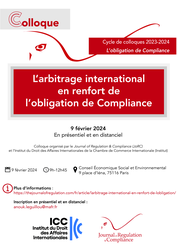
🌐follow Marie-Anne Frison-Roche on LinkedIn
🌐subscribe to the Newsletter MAFR Regulation, Compliance, Law
____
► Full Reference: M.-A. Frison-Roche, "Préalable : ce qu'est un engagement" ("Prerequisite: the Commitment"), in L. Aynès, M.-A. Frison-Roche, J.-B. Racine and E. Silva-Romero (dir.), L'arbitrage international en renfort de l'obligation de Compliance (International Arbitration in support of the Compliance Obligation), Journal of Regulation & Compliance (JoRC) and Institute of World Business Law of the ICC (Institute), Conseil Économique Social et Environnemental (CESE), Paris, February 9, 2024
____
🧮see the full programme of this event
____
🌐consult on LinkedIn a general presentation of this event, which links to a presentation of each speech (in French)
____
____
🔲see the slides used to support the presentation (in French)
____
🎤see a presentation of the conference "Préalable : ce qu'est l'Obligation de Compliance" ("Prerequisite: what is the Compliance Obligation"), given at the same symposium
____
🎤see a presentation of the conference "Le renforcement des engagements de Compliance par le renvoi Ex Ante à l'arbitrage international" ("Reinforcing Compliance commitments by referring Ex Ante to International Arbitration") which was finally not pronounced but will be the subject of an 📝article in the forthcoming book 📘Compliance Obligation
____
► Presentation of the conference: Having defined the Compliance Obligation in "Préalable : ce qu'est l'Obligation de Compliance" ("Prerequisite: what is the Compliance Obligation"), I set out to define what a commitment is.
No one doubts that commitments, as words, constitute facts that can engage the liability of companies if there are inconsistencies or lies. The question today is whether a commitment can constitute a legal act, binding in ex ante.
Companies make commitments either to fulfil their legal Compliance obligations, which is simply obeying the law, or to express their own wishes, either for themselves or for others. The cases are often confused, even though the scope is not the same.
If the commitment takes the form of a contract, Compliance is concerned if the contract is used as an Ex Ante Compliance Tool📎
The commitment, a concept that comes more from the Economics of Regulation, was conceived between a Regulatory Authority and a Company: it is the unilateral decision of the Authority that gives legal force to the commitment. Case law confirms this (Conseil d'État (French Council of State)📎
If commitment is central to Compliance, particularly Vigilance, it is because Compliance Law is an extension of Regulatory Law📎
In drawing up a plan, the company is fulfilling its legal obligation. But if we were to consider that it is a commitment, then we would also have to consider that the plan is the result of its will, that it must consult the stakeholders in its preparation, but that the source of the plan is its will: the provisions are not stipulations, are not applications of the law, but unilateral voluntary provisions.
In this respect, and because its source is the will of the company (which does not prevent its co-construction), a plan could contain a "graduated offer" of arbitration.
This offer could be included in commitments that are less regulated by law, such as those made in the context of CSR.
________
🕴️M.-A. Frison-Roche (ed.), 📘Compliance Tools, 2021.
Jan. 17, 2024
Thesaurus : Doctrine

► Référence complète : E. Moyne, "Les impacts sur les droits de la défense des disparités de la justice pénale négociée dans l’Union européenne", in M.-A. Frison-Roche et M. Boissavy (dir.), Compliance et droits de la défense. Enquête interne – CJIP – CRPC, Journal of Regulation & Compliance (JoRC) et Dalloz, coll. "Régulations & Compliance", à paraître.
____
📕consulter une présentation générale de l'ouvrage, Compliance et droits de la défense - Enquête interne, CIIP, CRPC, dans lequel cet article est publié
____
► Résumé de l'article (fait par le Journal of Regulation & Compliance - JoRC) : L'auteur examine tout d'abord dans l'espace européen l'usage que le Droit français fait de ces techniques de justice négociée. Il constate leur extension continuelle, notamment de la CJIPP qui, de réforme en réforme, s'étend désormais à la fraude fiscale et aux délits environnementaux, estimant qu'il faudrait que cela puisse fonctionne à tout et à tous, c'est-à-dire d'une part à toutes les infractions, notamment en droit de la concurrence et à toutes les infractions financières, et d'autre part non seulement aux personnes morales mais encore aux personnes physiques.
L'espace européen est pour l'instant plutôt occupé par le Parquet européen, dont l'action pourrait être efficace pour mener à une transaction pénale ou à une CJ, notamment en matière environnementale. Pour l'instant l'hétérogénéité des procédures simplifiées à la disposition des différents procureurs européens délégués en matière de poursuite engendre un risque de forum shopping. En outre, l'absence d'harmonisation européenne des mécanismes de transaction pénale ou de CJIP rend difficile la mise en oeuvre de ceux-ci car non seulement de nombreux Etats-membres ne les ont pas même institués mais lorsque cela est le cas, les procédures sont très diverses, notamment concernant les droits de la défense...
____
🦉Cet article est accessible en texte intégral pour les personnes inscrites aux enseignements de la Professeure Marie-Anne Frison-Roche
________
Jan. 12, 2024
Conferences
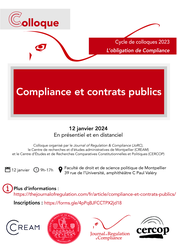
🌐follow Marie-Anne Frison-Roche on LinkedIn
🌐subscribe to the Newsletter MAFR Regulation, Compliance, Law
____
► Full Reference : M.-A. Frison-Roche, "Conclusion. Compliance et contrats publics : une alliance naturelle" ("Conclusion. Compliance and Public Contracts: a natural alliance"), in M.-A. Frison-Roche, C. Gilles & A. Oumedjkane (dir.), Compliance et contrats publics (Compliance and public contracts), Journal of Regulation & Compliance (JoRC), Centre de recherches et d’études administratives de Montpellier (CREAM) and Centre d’Études et de Recherches Comparatives Constitutionnelles et Politiques (CERCOP) of the Montpellier University, Faculté de droit et de science politique de Montpellier, 39 rue de l’Université, Amphiteatre C Paul Valéry, January 12, 2024
____
🧮see the full programme of this event
____
✏️read the notes taken on the spot to draw up the symposium conclusion
____
🌐consult on LinkedIn a general presentation of this event, which links to a presentation of each speech (in French)
____
🧱consult the co-organisation sheet of this event, giving an account of the various speakers
____
► English Summary of the conference: Firstly, it would appear that, as with all the contracts studied in the area of Compliance, public contracts are, for the public authorities or public companies, an instrument through which they implement the Compliance Obligation imposed on them by the laws and regulations. Public bodies involved in public contracts are particularly concerned because of the points of contact, even intimacy, between Compliance Law and the general interest. But the contract, whether public or private, remains in its classic conception what results from the expression of two wills which exchange their consents📎
Secondly, in terms of free will, public contracts can be the means by which public bodies and their co-contractors express their conception of what needs to be done to preserve the future, for example in environmental and social matters. On the contrary, the seemingly technical issue of exclusions from public contracts, whether they be automatic exclusions or optional exclusions, expresses the extent to which economically powerful players (public authorities, municipalities, public companies) take care of each other. In this respect, Compliance Law runs counter to Competition Law📎
But thirdly, the public contract, in that it expresses the general interest by its very nature, its ex ante nature reinforces regulatory action and the nature of Compliance as an extension of Regulation📎
Moreover, fourthly, the public contract appears to be the model for the Compliance Contract. The public contract is a model first of all because of the central place of the general interest. The "Monumental Goals" in which the substantive definition of Compliance Law is anchored📎
The public contract is also a model because the contract is handled by a powerful party, in this case the public entity. The subject of Compliance Law is the powerful company, and only that company, chosen because it is powerful and because it uses that power to achieve the Monumental Goals. In this respect, the "exorbitant powers" that characterise the public contractor are reconstituted either by Compliance laws or by stipulations, which confer on all obliged or voluntary companies - by virtue of CSR, which has many points of contact with Compliance Law as long as it is not confused with obeying the applicable regulations (which is what "conformity" is)📎
The judge is the one who, through contractual litigation, both public and private, will bring to life these Monumental Goals desired by the State, carried by powerful entities (administration, companies), pledge of the Rule of Law📎
These include contractual mechanisms for information, audit, disclosure, control, collaboration, supervision, etc., through which the company, whether private or public, takes charge of the structure it has created, for example the value chain it masters📎
It can therefore be concluded that this logic of a public contract as an instrument of administrative action to achieve goals of general interest, now fully taken up in Compliance Law, must be acculturated into the Ordinary Contract Law and must be preserved in Public Contract Law, which presupposes a new balance with Competition Law, which for a long time carried within Public Law a contract model without concern for sustainability or the collective interest. To achieve this, dialogue between judges is essential. The Conseil d'État (French Council of State) and the Cour de cassation (French Court of cassation) set the example📎
____
📝This conference will be followed by an article, "The public contract, model of the Compliance Contract", which will be published in the book 📘Compliance and contract.
________
🕴️M.-A. Frison-Roche, 🚧Competition Law and Compliance Law, 2018.
🕴️M.-A. Frison-Roche (ed.), 📕Régulation, Supervision, Compliance (Regulation, Supervision, Compliance), 2017.
🕴️M.-A. Frison-Roche, 📝Compliance Monumental Goals, beating heart of Compliance Law, in 🕴️M.-A. Frison-Roche (ed.), 📘Compliance Monumental Goals, 2022.
🕴️M.-A. Frison-Roche, 📝Reinforce the Judge and the Lawyer to impose Compliance Law as a characteristic of the Rule of Law, in 🕴️M.-A. Frison-Roche (ed.), 📘Compliance Jurisdictionalisation, 2023.
🕴️M.-A. Frison-Roche, 📝Reinforce the Judge and the Lawyer to impose Compliance Law as a characteristic of the Rule of Law, in 🕴️M.-A. Frison-Roche (ed.), 📘Compliance Jurisdictionalisation, 2023.
🕴️M.-A. Frison-Roche, 📝Assessment of whistleblowing and the obligation of vigilance regarding International Competitiveness, in 🕴️M.-A. Frison-Roche (ed.), 📘Compliance Monumental Goals, 2022.
Conseil d'État (French Council of State) and Cour de cassation (French Court of cassation), 📗Du droit de la régulation au droit de la compliance : quel rôle pour le juge ?, La Documentation Française, 2024 (to be published).
Oct. 1, 2023
Thesaurus : Doctrine
► Référence complète : J.-C. Roda, "Les obligations environnementales et numériques pesant sur les entreprises : quelle gestion des risques concurrentiels ?", Revue Lamy de la concurrence, n°131, 1er octobre 2023, actualité 4501.
____
► Résumé de l'article (fait par l'auteur) : "Les entreprises cruciales sont aujourd'hui soumises à des obligations de plus en plus lourdes et qui concernent l'environnement et le numérique. Le franchissement de seuils de « taille » oblige désormais ces acteurs à se plier à la logique de la vigilance et de la compliance. De telles obligations ont un impact concurrentiel, surtout si l'on envisage les choses sous l'angle de la concurrence mondialisée. Comment, dès lors, les entreprises concernées peuvent-elles réagir, pour transformer la contrainte en un nouveau départ ? Celui-ci est-il envisageable ? Faut-il faire acte de résilience ou de résistance ?"
____
🦉Cet article est accessible en texte intégral pour les personnes inscrites aux enseignements de la Professeure Marie-Anne Frison-Roche
________

July 15, 2023
Publications

♾️follow Marie-Anne Frison-Roche on LinkedIn
♾️subscribe to the Newsletter MAFR Regulation, Compliance, Law
____
► Full Reference: M.-A. Frison-Roche, The deployment of Regulatory Law through Compliance Law in the European project, Working Paper, July 2023.
____
📝this Working Paper is the basis for the article "Le déploiement du Droit de la Régulation par le Droit de la Compliance dans le projet européen" ("The deployment of Regulatory Law through Compliance Law in the European project"), which is part of the special issue La régulation par la compliance, perspective européenne, published in French by the Revue des affaires européennes (Law and European Affairs).
____
► Summary of this Working Paper: Compliance Law is neither a method of obeying regulations, nor a simple neutral method of ensuring the effectiveness of norms, nor a means of enforcement displaced from Ex Post to Ex Ante. It is an extension of Regulatory Law and goes beyond it. Like it, it aims to build spaces according to a political project specific to an area, such as Europe. Branch of Law looking to the future as Regulatory Law does, it constructs and maintains, in a systemic way, sustainable, albeit unstable, balances to achieve the 'Monumental Goals' in which its normativity resides: : security, sustainability, probity, truth, and dignity. By internalising these Monumental Goals in the companies in a position to achieve them, the "crucial companies", Compliance Law preserves the logic of Regulatory Law, offering it a prodigious expansion since it frees it from the condition of a sector and territorial borders, which seemed tautological, by associating private powers and public will, which remains primary. In this way, Compliance can regulate the digital space and climate issue through political choices made by a sovereign Europe.
________
🔓read the developments below⤵️
June 28, 2023
Newsletter MAFR - Law, Compliance, Regulation

♾️suivre Marie-Anne Frison-Roche sur LinkedIn
♾️s'abonner à la Newsletter MAFR Regulation, Compliance, Law
____
► Référence complète : M.-A. Frison-Roche, "S'engager n'est pas contracter (décision du Conseil d'État du 21 avril 2023, Orange c/ Arcep)", Newsletter MAFR Law, Compliance, Regulation, 28 juin 2023.
____
📧Lire par abonnement gratuit d'autres news de la Newsletter MAFR - Law, Compliance, Regulation
____
🔴Engagements, acceptation, convention : multiplication de ces actes de volonté acceptés qui ne sont pourtant pas des contrats et échappent à leurs principes
Dans sa décision du 21 avril 2023, société Orangec/ Arcep, le Conseil d'État dit ce que ne constitue pas les engagements souscrits par l'opérateurs pour le déploiement de la fibre, acceptés par le ministre : ce n'est pas un contrat. La "qualification négative" est donc donnée. Mais alors qu'est-ce que c'est ?
____
📧lire l'article ⤵️
Updated: June 16, 2023 (Initial publication: Nov. 24, 2022)
Conferences

♾️ suivre Marie-Anne Frison-Roche sur LinkedIn
♾️ s'abonner à la Newsletter MAFR Regulation, Compliance, Law
____
 ► Référence complète : Frison-Roche, M.A., Les programmes de compliance, in Université de Lille, Les risques concurrentiels des entreprises à l’aune de la transition écologique et numérique : regards croisés sur les outils de prévention, Lille, 16 juin 2023. ____
► Référence complète : Frison-Roche, M.A., Les programmes de compliance, in Université de Lille, Les risques concurrentiels des entreprises à l’aune de la transition écologique et numérique : regards croisés sur les outils de prévention, Lille, 16 juin 2023. ____
► Présentation générale de la conférence : sss
____
► pour aller plus loin ⤵️
May 17, 2023
Thesaurus : Doctrine
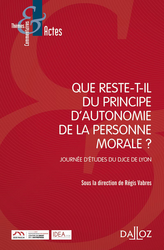
► Référence complète : J.-Ch. Roda, "La personne morale en droit de la concurrence : entre effacement et persistance", in R. Vabres (dir.), Que reste-t-il du principe d'autonomie de la personne morale ? - Journée d'études du DJCE de Lyon, coll. "Thèmes & Commentaires", Dalloz, 2023, pp.91-101.
____
► Résumé de l'article :
____
🦉Cet article est accessible en texte intégral pour les personnes inscrites aux enseignements de la Professeure Marie-Anne Frison-Roche
________

April 25, 2023
Publications

🌐follow Marie-Anne Frison-Roche on LinkedIn
🌐subscribe to the Newsletter MAFR Regulation, Compliance, Law
____
 ► Full Reference: M.-A. Frison-Roche, The role of the Judge in the deployment of Regulatory Law through Compliance Law, Working Paper, April 2023.
► Full Reference: M.-A. Frison-Roche, The role of the Judge in the deployment of Regulatory Law through Compliance Law, Working Paper, April 2023.
____
🎤 This working paper was drawn up to serve as the basis for the concluding summary session of the colloquium organised by the Conseil d'Etat (French Administrative Supreme Court) and the Cour de cassation (French Judicial Supreme Court), De la régulation à la compliance: quel rôle pour le juge? ("From Regulation to Compliance: what role for the Judge?") held on 2 June 2023 at the Conseil d'Etat.
____
📝 This working paper also served as the basis for the article that concludes the book De la régulation à la compliance : quel rôle pour le juge, published by the La Documentation Française, 2024.
____
► Working Paper Summary: It is remarkable to note the unity of conception and practice between professionals who tend to work in administrative jurisdictions and professionals who tend to work in judicial jurisdictions: they all note, in similar terms, an essential movement: what Regulatory Law is, how it has been transformed into Compliance Law, and how in one and even more so in the other the Judge is at the centre of it. Judges, as well as regulators and European officials, explain this and use different examples to illustrate the profound transformation this has brought about for the law and for the companies responsible for increasing the systemic effectiveness of the rules through the practice and dissemination of a culture of compliance. The role of the judge participating in this Ex Ante transformation is renewed, whether he is a public law judge or a private law judge, in a greater unity of the legal system.
____
🔓read the Working Paper below⤵️

April 12, 2023
Publications

March 15, 2023
Thesaurus : Doctrine
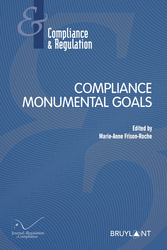
► Full Reference: J.-Ch. Roda, "Compliance, Internal Investigations and International Competitiveness: What are Risks for the French Companies (in the Light of Antitrust Law)?", in M.-A. Frison-Roche (ed.), Compliance Monumental Goals, coll. "Compliance & Regulation", Journal of Regulation & Compliance (JoRC) and Bruylant, 2023, p. 355-368.
____
📘read a general presentation of the book, Compliance Monumental Goals, in which this article is published.
____
► Summary of the article:
________
Updated: Feb. 2, 2023 (Initial publication: March 31, 2021)
Thesaurus : Doctrine

► Full Reference: J.-B. Racine, "Compliance et Arbitrage. Essai de problématisation" ("Compliance and Arbitration : Problematisation", in M.-A. Frison-Roche (ed.), La juridictionnalisation de la Compliance, coll. "Régulations & Compliance", Journal of Regulation & Compliance (JoRC) and Dalloz, 2023, p. 265-279.
____
📕read a general presentation of the book, La juridictionnalisation de la Compliance, in which this article is published
____
► The summary below describes an article that follows an intervention in the scientific manifestation Compliance et Arbitrage, co-organised by the Journal of Regulation & Compliance (JoRC) and the University Panthéon-Assas (Paris II). This conference was designed by Marie-Anne Frison-Roche and Jean-Baptiste Racine, scientific co-directors, and took place in Paris II University on March 31, 2021.
In the book, the article will be published in Title II, devoted to: Compliance et Arbitrage.
____
► Summary of the article (done by the author): Under the consideration of the "Compliance Juridictionalisation", it is necessary to study in the links between Compliance and Arbitration. The arbitrator is a judge, he is even the natural judge of international trade. Arbitration is therefore naturally intended to meet compliance which transforms the action of companies in an international context. However, the links between compliance and arbitration are not obvious. It is not a question of providing firm and definitive answers, but rather, and above all, of asking questions. We are at the start of reflection on this topic, which explains why there is, for the time being, little legal literature on the subject of the relationship between Compliance and Arbitration. It doesn't mean there aren't connections. Quite simply, these relations may not have come to light, or they are in the making. We should research the existing or potential bridges between two worlds that have long gravitated separately: Compliance on the one hand, Arbitration on the other. The central question is: is or can the arbitrator be a compliance judge, and, if so, how?
In any event, the Arbitrator is thus in contact with matters requiring the methods, tools and logic of Compliance. In addition to the prevention and suppression of corruption, three examples can be given.
- Arbitration has been facing economic sanctions (notably embargoes) for several years. The link with Compliance is obvious, insofar as texts providing for economic sanctions are often accompanied by compliance mechanisms, as in the United States. The arbitrator is concerned as to the fate he reserves in the treatment of the dispute with the measures of economic sanctions.
- Competition Law is a branch that came into contact with Arbitration from the end of the 1980s. The arbitrability of this type of dispute is now established and arbitrators apply it regularly. At the same time, Compliance has also entered Competition Law, admittedly more strongly in the United States than in France. The existence, absence or insufficiency of a compliance program aimed at preventing violations of the competition rules are thus circumstances which may assist the arbitrator in the assessment of anti-competitive behavior.
- Environmental Law is also concerned. There is environmental Compliance, for example with regard to the French law of March 27, 2017 on the duty of vigilance. Companies are thus responsible for participating in the protection of the environment, by internalizing these concerns in their internal and external operations (in their sphere of influence). As soon as an arbitrator is in charge for settling a dispute relating to Environmental Law, the question of the relationship to Compliance, from this angle, naturally arises.
It is therefore the multiple interactions between Compliance and Arbitration, actual or potential, which are thus open.
________

Updated: Dec. 28, 2022 (Initial publication: July 10, 2022)
Publications

♾️ follow Marie-Anne Frison-Roche on LinkedIn
♾️ subscribe to the Newsletter MAFR Regulation, Compliance, Law
____
 ► Full reference: M.A. Frison-Roche, Regulatory and Compliance Law, expression of the missions of a professional Order, Working Paper, July 2022.
► Full reference: M.A. Frison-Roche, Regulatory and Compliance Law, expression of the missions of a professional Order, Working Paper, July 2022.
____
🎤 This Working Paper has been done as basis for an intervention in the Annual Congress of the French Professional Order of the Géomètres-Experts, September 15, 2022 (conference given in French)
____
🎥watch the short presentation of this speech (in French)
____
🎥watch the full speech given on 15 September 2022, based on this working paper
____
► Summary of the Working Paper: Professional orders should not present themselves as exceptions, however legitimate they may be, in relation to a principle, which would be the competitive system, but as the expression of a principle. This principle is expressed by two branches of Law whose importance is constantly growing in European Law, liberal branches which are based on the conception of economic life and the definition of company, turned towards the future: the Regulatory Law and Compliance Law, two branches of Law at the same time related and distinct.
Indeed, and this is the topic of the first part, Competition Law conceives professional orders as exceptions since these "corporations" constitute structural agreements. French domestic legal system both consolidates the professional orders by backing them up to the State, which would sub-delegate its powers to them, but involves them in the questioning by the European Union of the States and their tools. Most often the temptation is then to recall with a kind of nostalgia the times when the professional orders were the principle but, except to ask for a restoration, the time would be no more.
A more dynamic approach is possible, in accordance with the more general evolution of Economic Law. Indeed, the Professional Order is the expression of a profession, a little-exploited concept in Economic Law, over which the Order exercises the function of "Second-level Regulator", the public authorities exercising the function of "First-level Regulator". The Banking and Financial Regulatory Law is built in this way and operates thank to that, at national, European, and global level. This is what should be linked.
The Professional Orders therefore have the primary function of spreading a "Culture of Compliance" among the professionals they supervise and beyond them (clients and stakeholders). This culture of Compliance is developed regarding the missions which are concretized by the professionals themselves.
Therefore, the second part of the Working Paper deals with the legal evolution of the notion of "Mission" which has become central in Economic and General Law, through the technique of the mission-based company. However, there are multiple points of contact between the raison d'être, the company with a mission and Compliance Law as soon as the latter is defined by the concrete and overly ambitious goals that it pursues. : the Monumental Goals.
Each structure, for example the French Ordre des Géomètres-Experts, is legitimate to set the Monumental Goal that it pursues and that it inculcates, in particular the conception of territory and the living environment, joining what unites all the Monumental Goals of Compliance: concern for others. The French Ordre des Géomètres-Experts, is adequate because it has a more flexible relationship, both tighter and broader, with the territory than the State itself.
By instilling this in professionals, the Professional Order develops in the practitioner an "ex ante responsibility", which is a pillar of Compliance Law, constituting both a charge and a power that the practitioner exercises, and of which the Professional Order must be the supervisor.
____
🔓read the Working Paper⤵️